Filter by
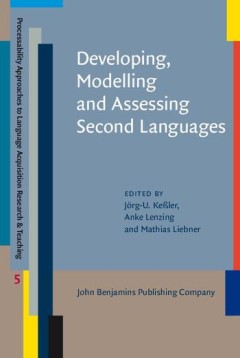
Developing, modelling and assessing second languages
This edited volume brings together the work of a number of researchers working in the framework of Processability Theory (PT), a psycholinguistic theory of second language acquisition (SLA) (Pienemann 1998; 2005). The aim of the volume is two-fold: It engages with current issues in both theory development and theory application and focuses on theoretical developments within the framework of PT …
- Edition
- -
- ISBN/ISSN
- 9789027267191
- Collation
- xviii, 244p. : ill.
- Series Title
- -
- Call Number
- 401.93 DEV d
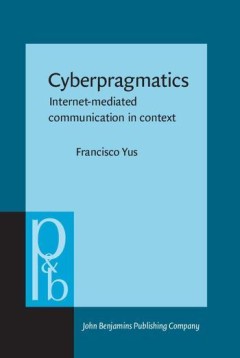
Cyberpragmatics : internet-mediated communication in context
Cyberpragmatics is an analysis of Internet-mediated communication from the perspective of cognitive pragmatics. It addresses a whole range of interactions that can be found on the Net: the web page, chat rooms, instant messaging, social networking sites, 3D virtual worlds, blogs, videoconference, e-mail, Twitter, etc. Of special interest is the role of intentions and the quality of interpretati…
- Edition
- -
- ISBN/ISSN
- 9789027256195
- Collation
- xic, 353p. : ill.
- Series Title
- -
- Call Number
- 401.450285 YUS c
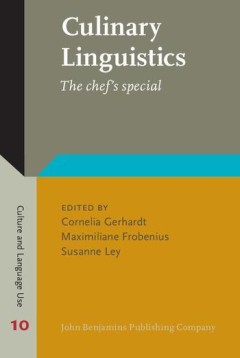
Culinary linguistics : the chef's special
Language and food are universal to humankind. Language accomplishes more than a pure exchange of information, and food caters for more than mere subsistence. Both represent crucial sites for socialization, identity construction, and the everyday fabrication and perception of the world as a meaningful, orderly place. This volume contains an introduction to the study of food and an extensive over…
- Edition
- -
- ISBN/ISSN
- 9789027202932
- Collation
- xvi, 347p. : ill.
- Series Title
- -
- Call Number
- 420.147 CUL c
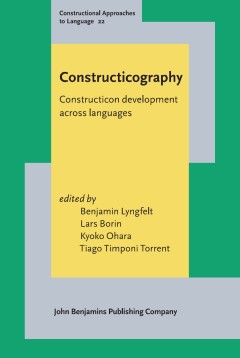
Constructicography : constructicon development across languages
In constructionist theory, a constructicon is an inventory of constructions making up the full set of linguistic units in a language. In applied practice, it is a set of construction descriptions – a “dictionary of constructions”. The development of constructicons in the latter sense typically means combining principles of both construction grammar and lexicography, and is probably best c…
- Edition
- -
- ISBN/ISSN
- 9789027263865
- Collation
- viii, 313p. : ill.
- Series Title
- -
- Call Number
- 415.01836 CON c
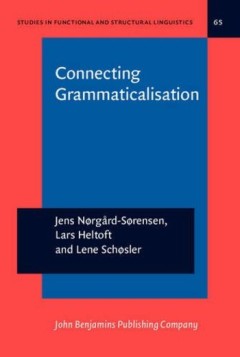
Connecting grammaticalisation
This monograph presents a view on grammaticalisation radically different from standard views centering around the cline of grammaticality. Grammar is seen as a complex sign system, and, as a consequence, grammatical change always comprises semantic change. What unites morphology, word order, constructional syntax and other grammatical subsystems is their paradigmatic organisation. The tradition…
- Edition
- -
- ISBN/ISSN
- 9789027284136
- Collation
- xiii, 347p. : ill.
- Series Title
- -
- Call Number
- 415 NOR c
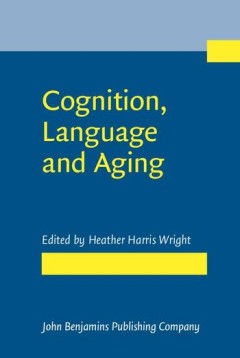
Cognition, language and aging
Age-related changes in cognitive and language functions have been extensively researched over the past half-century. The older adult represents a unique population for studying cognition and language because of the many challenges that are presented with investigating this population, including individual differences in education, life experiences, health issues, social identity, as well as gen…
- Edition
- -
- ISBN/ISSN
- 9789027267313
- Collation
- viii, 248p. : ill.
- Series Title
- -
- Call Number
- 408.46 COG c
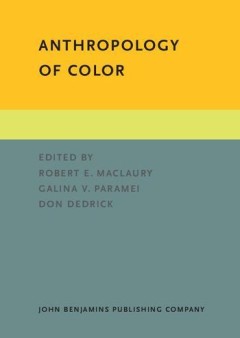
Anthropology of color : interdisciplinary multilevel modeling
The field of color categorization has always been intrinsically multi- and inter-disciplinary, since its beginnings in the nineteenth century. The main contribution of this book is to foster a new level of integration among different approaches to the anthropological study of color. The editors have put great effort into bringing together research from anthropology, linguistics, psychology, sem…
- Edition
- -
- ISBN/ISSN
- 9789027291707
- Collation
- xx, 485p. : ill.
- Series Title
- -
- Call Number
- 306.44 ANT a
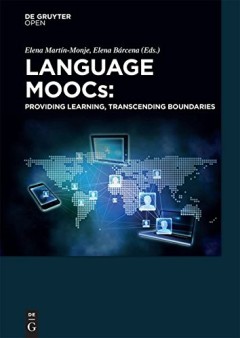
Language MOOCs : providing learning, transcending boundaries
Language MOOCs (or LMOOCs) are dedicated Web-based online courses for second languages with unrestricted access and potentially unlimited participation. They are generating interest and expectation in the contexts of university education, lifelong learning and online training in general. This pioneering book presents an initial analysis of the theoretical and methodological issues underlying LM…
- Edition
- -
- ISBN/ISSN
- 9783110422504
- Collation
- x, 175p. : ill.
- Series Title
- -
- Call Number
- 371.3344678 LAN l
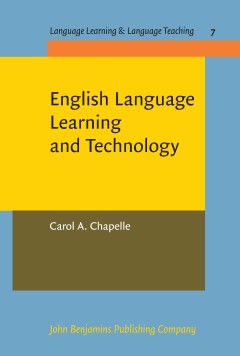
English language learning and technology : lectures on applied linguistics in…
This book explores implications for applied linguistics of recent developments in technologies used in second language teaching and assessment, language analysis, and language use. Focusing primarily on English language learning, the book identifies significant areas of interplay between technology and applied linguistics, and it explores current perspectives on perennial questions such as how …
- Edition
- -
- ISBN/ISSN
- 9789027217042
- Collation
- xvi, 213p. : ill.
- Series Title
- -
- Call Number
- 428.0071 CHA e
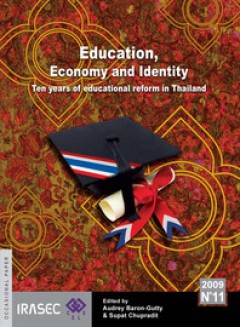
Education, economy and identity : ten years of educational reform in Thailand
Modern education in Thailand started at the end of the nineteenth century under the impulse of King Chulalongkorn. Many scholars tracing back the evolution from traditional education to a modern education system emphasized the feeling of necessity that motivated this transformation. Wyatt (1969), Mead (2004) and Watson (1982) underlined the need for a modern administration, to handle the Si…
- Edition
- -
- ISBN/ISSN
- 9786169028208
- Collation
- 114p. : ill.
- Series Title
- -
- Call Number
- 379.593 EDU e
 Computer Science, Information & General Works
Computer Science, Information & General Works  Philosophy & Psychology
Philosophy & Psychology  Religion
Religion  Social Sciences
Social Sciences  Language
Language  Pure Science
Pure Science  Applied Sciences
Applied Sciences  Art & Recreation
Art & Recreation  Literature
Literature  History & Geography
History & Geography